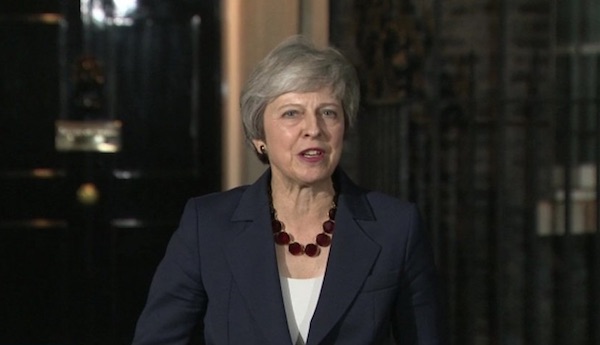
Negotiations on Britain’s withdrawal from the European Union have reached a decisive moment as a draft agreement won the support of the Tory government in London.
A closely-watched meeting of the British cabinet ended tonight with the British Prime Minister making a public statement to say her cabinet had made the “collective decision” to agree a draft text with the European Union.
Speaking to the media outside No 10 Downing Street, Theresa May said there had been “decisive progress”. She said the draft deal involved difficult choices but was in the “national interest”.
She said that she and her ministers had a “long, detailed and impassioned debate” on the draft withdrawal agreement and that she believed it was the “best that could be negotiated”.
“This is a decision which enables us to move on and finalise the deal in the days ahead,” she said.
A number of reports indicate that significant changes have been made in the draft text to a previously agreed border ‘backstop’. The mechanism is intended to ensure that there will be no return of inflammatory border checks or controls in the north of Ireland.
It now appears likely to be subsumed into a bigger scheme for a customs deal for the full British jurisdiction, thus averting the potential ‘border in the Irish Sea’ which had been bitterly opposed by unionists.
Media coverage was focused today on the opinions of hard-right Tories and their allies in the unionist DUP. Theresa May requires the support of both groups to pass votes at Westminster and to maintain her minority government.
In order to satisfy them, the new backstop also now includes a review mechanism -- described as a ‘backstop to the backstop’. It means that the arrangement can be ended at a future date through an alternative reached by arbitration between Britain and the EU. A legal structure would prevent the British from unilaterally reneging on the deal, a suggestion which came under strong resistance from unionists and the anti-EU Tories today.
Another major issue for Brexit hardliners at the cabinet talks was the EU requirement of a ‘level playing field’, which would limit Britain’s capacity to forge international trade deals while it remains in the EU Customs Union.
The draft withdrawal agreement, which has been drawn up alongside a statement of future relations with the EU, has not yet been published, but is thought to run to some 500 pages.
Speaking before the British Prime Minister made her statement this evening, Sinn Fein leader Mary Lou McDonald said the withdrawal agreement must give legal effect to the ‘cast iron’ guarantee on the border which the Taoiseach Leo Varadkar claimed to have secured in December.
“While we await the publication of this document, it is a matter of concern that some are presenting the backstop agreement as temporary,” she said.
“Brexit is for the long term and what is required is a durable, permanent and legally robust agreement that safeguards Irish interests and ensures there is no hard border on the island of Ireland.”
Sinn Fein MEP Martina Anderson has also warned that the rights associated with the Common Travel Area -- travel protections, residency and social rights -- must be protected from Brexit.
“We cannot allow any diminution of our rights as a result of the Brexit strategy being pursued by the Tories and their allies.
“We have been given ‘cast iron’ guarantees on our rights by the Irish government. Now we need to see action on those guarantees to protect our rights.
“Our rights cannot be sacrificed to a Brexit that people in the north rejected. We need action from the EU and the Irish government to ensure the Tories do not undermine our rights.”
Leo Varadkar seemed to be caught off guard yesterday as news emerged of a possible deal, admitting in the Dail that he had no information about it and dismissing reports as “headlines”.
But earlier today he said unionists should be assured that the text would not negatively impact “the territorial integrity of the UK”.
He said he recognised that “for the unionist community this is quite a difficult time”. He did not refer to the concerns of the nationalist community.
“I know many unionists may be feeling vulnerable, isolated and many may be quite worried about what may be agreed in the coming days,” he added.
“I want to say to them - the Good Friday Agreement will be protected - it includes a recognition of the fact we respect the territorial integrity of the UK and the principle of consent, that there will be no change to the constitutional status of Northern Ireland unless a majority of people say so.”
He said he was happy to have that written into any agreement as a legal guarantee.
DUP leader Arlene Foster travelled to London today and said she wanted to meet May discuss the draft text in person. A meeting is set to take place later this evening -- to protests from politicians in Scotland, Wales and other parties in the north of Ireland, who have all been shut out of the talks.
Mrs Foster said she would “not be led by the Irish government” about coming to a view of the draft deal.
“We are concerned about the narrative that has built up around the prime minister’s proposal,” she added.
“We will make our own judgements, and we will certainly not be led by the Irish government who have been aggressive in all of this.”
Mrs Foster said if Theresa May reneged on commitments she had made, there would be “consequences”.
![[Irish Republican News]](https://republican-news.org/graphics/title_gifs/rn.gif)
![[Irish Republican News]](https://republican-news.org/graphics/title_gifs/harp.gif)

